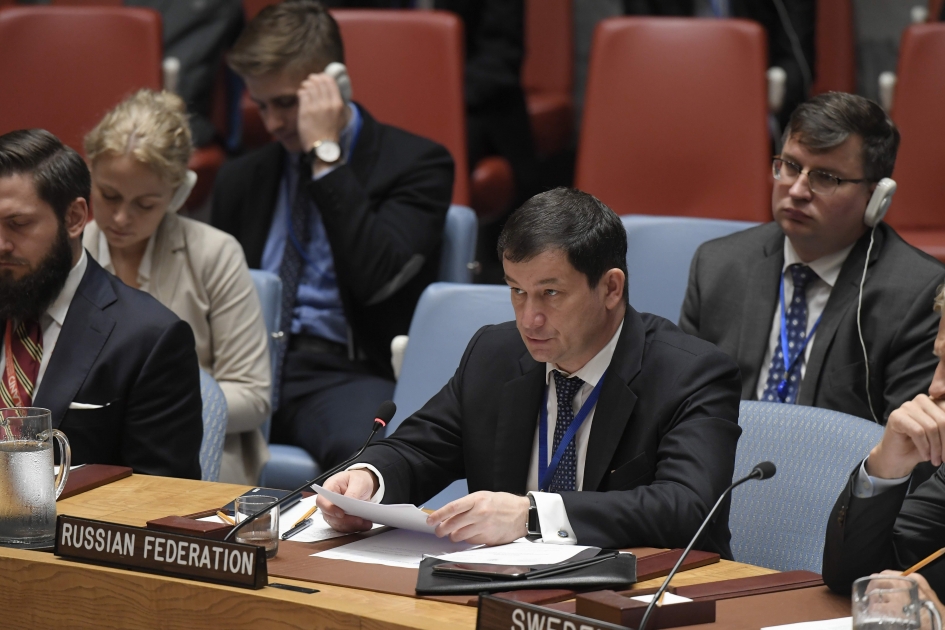Statement by Mr.Dmitry Polyanskiy, First Deputy Permanent Representative of the Russian Federation to the United Nations, at the Security Council on the sitiation in Abyei
We would like to thank Under-SecretaryGeneral Jean-Pierre Lacroix and Special Envoy Nicholas Haysom for their substantive briefings.
We believe that the continuation of the joint efforts of the parties, including the political dialogue at the highest level, are key to the successful progress of the intra-Sudanese peace process. The basis for cooperation between Khartoum and Juba exists, namely, the bilateral agreements concluded in September 2012 in Addis Ababa, as well as the relevant Security Council resolutions.
We welcome the improvement recently noted in the relations between the two Sudans. We pay tribute to the effective participation of Khartoum in the mediation efforts of the Intergovernmental Authority on Development to revitalize the South Sudanese Peace Agreement. We note the efforts of the African Union and its High-level Implementation Panel under the leadership of Mr. Thabo Mbeki. We hope that the Panel will continue to be an important mechanism for promoting the normalization of relations between the two countries.
We note with satisfaction the generally stable situation in Abyei, as well as the constructive relations of the personnel of the United Nations Interim Security Force for Abyei (UNIFSA) with the local inhabitants and the measures taken by UNIFSA to prevent intercommunal clashes. Among the positive aspects, we would also like to highlight the periodic holding of meetings of peace committees with representatives of the Ngok Dinka and Misseriya communities.
We welcome the fact that law enforcement and economic matters are addressed at such events. It is important that the Amiet common market is slowly becoming the economic hub not only for Abyei but for the region as a whole. We are convinced that it has contributed to strengthening trust and reconciliation between the two communities. We regret that not all of the provisions of the inter-Sudanese Agreement of 20 June 2011 are being implemented. A power vacuum remains in the Area. The demilitarized status of Abyei and the buffer zone along the inter-Sudanese border is being violated.
We would like to see increased regular contact between the leaders of the Sudan and South Sudan. With regard to the enhanced Joint Border Verification and Monitoring Mechanism (JBVMM), we welcome the progress made by the parties in fulfilling their obligations to make it fully operational. We believe that the JBVMM is an important element in preventing incidents between the two parties. We continue to believe that scaling back UNISFA support for the Mechanism could completely paralyse the structure and have a negative impact on the prospects for a full resolution to the situation in Abyei.
Guided by that, we supported the adoption of resolution 2412 (2018), which extended the UNISFA mandate by six months. We will be ready to support a similar extension in October. We took note of the letter of the SecretaryGeneral (S/2018/778), which includes proposals on reconfiguring UNISFA. We believe that the issue must be carefully addressed and examined.
We understand that there is little progress being made in resolving the Abyei dispute. We note that a whole range of factors has prevented Khartoum and Juba from demonstrating the flexibility required to resolve the final status of Abyei. In that regard, UNISFA plays a very important role in maintaining stability in the region. Once again, we would like to recall that UNISFA is operating within the confines of traditional peacekeeping, in which the parties to the conflict are States.
When making decisions on reconfiguring the Mission, it is important to be guided by the basic principles of peacekeeping. We believe that the changes proposed by the Secretariat with regard to strengthening the civilian component and changing the mandate and personnel ceiling of the mission must first be supported by both Khartoum and Juba.
We must also take into account the views of the troop-contributing countries. If not, the effect of the reconfiguration could be the exact opposite of what is intended.
